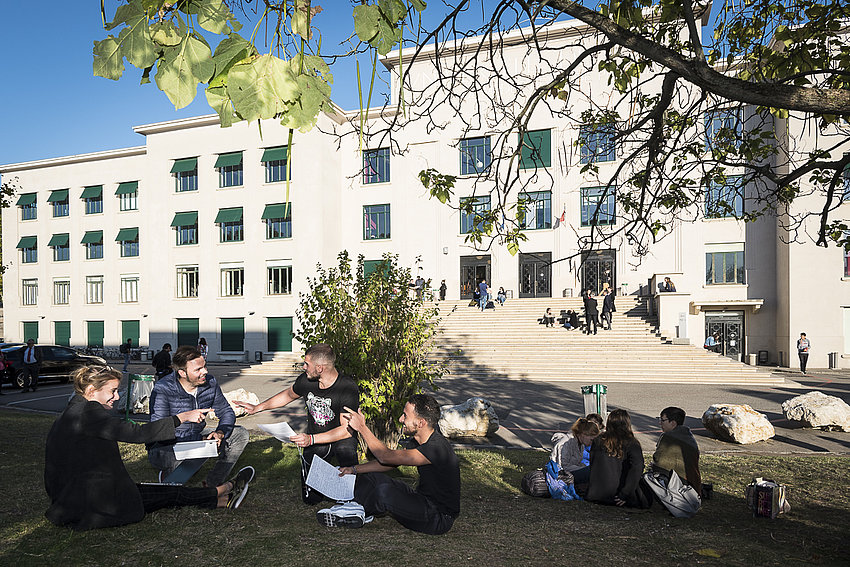How to study in Lyon
Ways to do things, tips, and everything you need to enjoy your student years in Lyon Métropole.
1. Enrolling in an establishment of higher education
Before enrolling, you need to choose which course of studies and professional pathway are the right ones for you. Here is our advice to help you get oriented.
Are you arriving in Lyon from another country? Here, you’ll find all the information you need to enroll and install yourself in the city. You can also go to the Student Welcome Desk, where you will receive guidance and help with your administrative formalities.
For your first enrollment in a university, an online procedure has been implemented. Connect to Parcoursup.
Among other things, you will need:
- Your complete university file,
- A copy of your ID card or passport,
- Two ID photos,
- Civil liability insurance,
- A means of payment,
- A photocopy of the CVEC document.
Please note
Every students must pay a student life and campus contribution (CVEC). It is required of all students undergoing initial training (except scholarship students, who are exonerated) before enrolling in an establishment of higher education. You must pay a total of €91 on the MesServices.etudiant.gouv.fr platform, starting July 1.
2. Formalities and useful information for studying in Lyon Metropole

How can you finance your studies? Here is a list of financial assistance for students.
When you enroll, you are affiliated to a social security regime. You can also sign up for complementary mutual insurance. Here is all the information on health.
If you will not be living with your parents, you need to find housing close to your school. Here, you will find our tips on how to find housing, and here, you will find the list of all types of housing assistance.
If you plan to stay for some time in Lyon Metropole, you can register on the electoral roll so that you can vote in your new city. You’ll find the necessary information on your city’s website.
For travel between your home and your place of study, have a look here to find transportation possibilities and solutions in Lyon Metropole.
Will you need to get a job while you study? Here is where you’ll find our advice for finding a student job and what you mustn’t forget to declare. Would you like to acquire professional experience during your studies? On this page, you’ll find complete information on internships and work-study programs in Lyon Metropole.
3. Tips for getting the most out of student life in Lyon
For student offers and practical advice, see the LyonCampus tips to learn how you can best take advantage of student life in Lyon Metropole.
Discover all the cultural advantages that are yours as a student in Lyon Metropole!
Do you want to commit to a passionate interest or a cause? Join a student association! See the list of associations (french version only) in Lyon Metropole.
Student glossary
BDE/BDS: The Bureaux des Étudiants and Bureaux des Sports are student associations found in each establishment; they bring students together for festive or sports events.
Certificat de Scolarité: You will receive a Certificat de Scolarité when you enroll in an academic establishment. Be sure to keep it in a safe place because you will be asked for it regularly to justify your status as a student.
Césure (gap year): You may take a gap year between two years of a same cycle. You must justify taking the year off (for an internship, for civil service, etc.). You cannot take a gap year to go on vacation.
ECTS credits: ECTS credits are European credits that enable greater mobility in Europe for students and that facilitate recognition of a degree.
CROUS: This entity administers scholarships, public residences and a number of university restaurants and cafeterias. It also organizes numerous cultural contests and activities throughout the year.
CVEC: The CVEC contribution is mandatory and enables funding campus life and medical centers for students.
JPO: The Journées Portes Ouvertes (Open House Days) allow high school or university students to discover an establishment or a specialty.
LMD: Licence / master’s / doctorate, abbreviated LMD.
Major / minor: The major corresponds to the primary program you follow in your course of studies. The minor is your secondary program.
Parcoursup: Parcoursup is the platform that lets you state your wishes and enroll in the first year of training.
Partiel: “Partiels” are tests given at the end of a semester to check material learned.
Rattrapage: If you fail a partiel, you can try again during “rattrapages” (catch-up exams).
Semester: The school year is divided into two semesters, from September to January and from February to May. Each semester, you follow different courses.
UE: A Unité d’Enseignement is a set of courses that cover several shared learning areas.

